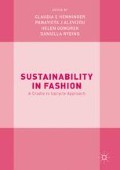Abstract
As the lowest level in the subcontracted supply chain, homeworkers are invisible and subject to exploitation. Existing codes of conduct and monitoring schemes favor the rights of the visible workforce employed in industrial settings in tier 1 factories. We conducted qualitative field research with the Self Employed Women’s Association’s (SEWA) embroidery center in New Delhi, India. Findings provide understanding of the sustainable management policies and practices that have been put in place to assure global buyers that homework can be carried out in ways consistent with standards for human rights, making it a protected component of sustainable supply chains.
Access this chapter
Tax calculation will be finalised at checkout
Purchases are for personal use only
References
American Society of International Law. (1997). International labour conference: Home work convention, 1996 and recommendation concerning home work. International Legal Materials, 36(1), 55–64.
Bhatt, E. R. (2006). We are poor but so many: The story of self-employed women in India. Oxford, UK: Oxford University Press.
Bhatt, E., & Jhabvala, R. (2004). The idea of work. Economic and Political Weekly, 39(48), 5133–5140.
Boris, E. (1989). Homework and women’s rights: The case of the Vermont knitters, 1980–85, in E. Boris & C. R. Daniels (Eds.) Homework: Historical and contemporary perspectives on paid labor at home (pp. 233–257). Urbana: University of Illinois Press.
Brill, L. (2002). Can codes of conduct help home-based workers?, in R. Jenkins, R. Pearson, & G. Seyfang (Eds.) Corporate responsibility and labour rights: Codes of conduct in the global economy (pp. 113–123). London: Earthscan Publications Ltd.
Burchielli, R., & Delaney, A. (2009). Homework and CSR: Can homeworkers benefit? In: 15th World Congress of the International Industrial Relations Association (IIRA), 24 August 2009–28 August 2009, Sydney Convention and Exhibition Centre.
Buttle, M. (2008, 18 July). Homeworking in the Indian garment industry: What are the issues and how can homeworkers’ lives be improved. Retrieved 2011, 5 April from impact: http://www.impacttlimited.com/2008/07/18/homeworking-in-the-indian-garment-industry-what-are-the-issues-and-how-can-homeworkers-lives-be-improved/.
Castka, P., & Balzarova, M. A. (2007). A critical look on quality through CSR lenses: Key challenges stemming from the development of ISO 26000. International Journal of Quality & Reliability Management, 24(7), 738–752.
Castka, P., Bamber, C. J., Bamber, D. J., & Sharp, J. M. (2004). Integrating corporate social responsibility (CSR) into ISO management systems – in search of a feasible CSR management system framework. TQM Magazine, 16(3), 216–224.
Datta, R. (2003). From development to empowerment: The self-employed women’s association in India. International Journal of Politics, Culture, and Society, 16(3), 351–368.
Delaney, A. (2004). Global trade and home work: Closing the divide. Gender and Development, 12(2), 22–28.
Delaney, A. (n.a.). Accounting for corporate social responsibility: Does it benefit workers across the supply chain?
Dickson, M. A., & Chang, R. K. (2015). Apparel manufacturers’ path to world class corporate social responsibility: Perspectives of CSR professionals, in T.-M. Choi & T. C. E. Cheng (Eds.) Sustainable fashion supply chain management (pp. 107–127). Springer: Switzerland.
Dickson, M. A., Loker, S., & Eckman, M. (2009). Social responsibility in the global apparel industry. New York: Fairchild Books.
ETI. (2010). Homeworkers and homeworking: An introduction. Retrieved 2011, 7 April from http://www.ethicaltrade.org/in-action/projects/homeworkers-project/guidelines.
Freeman, D. (2003). Homeworkers in the global supply chains. Greener Management International, 43, 107–118.
Green, N. L. (2003). Fashion, flexible specialization, and the sweatshop: A historical problem, in D. E. Bender & R. A. Greenwald (Eds.) Sweatshop USA: The American sweatshop in historical and global perspective (pp. 37–56). Routledge: New York.
Hensman, R. (2005). Defending workers’ rights in subcontracted workplaces, in W. W. Worldwide, A. Hale, & J. Wills (Eds.) Threads of labour garment industry supply chains from the worker’s perspectives (Vol. 1, pp. 189–209). Blackwell Publishing Ltd: Malden, MA.
Hurley, J., & Miller, D. (2005). The changing face of the global garment industry, in W. W. Worldwide, A. Hale, & J. Wills (Eds.) Threads of labour garment industry supply chains from the worker’s perspectives (Vol. I, pp. 16–39). Blackwell Publishing Ltd: Malden, MA.
Kapoor, A. (2007). The SEWA way: Shaping another future for informal labour. Futures, 39: 554–568.
Littrell, M. A., & Dickson, M. A. (2010). Artisans and fair trade crafting development. Sterling, VA: Kumarian Press.
Marian, P. (2013, July 1). Harnessing homeworkers in the apparel supply chain. Available from www.just-style.com
McCormick, D., & Schmitz, H. (2001). Manual for value chain research on homeworkers in the garment industry. Manual.
SEWA Bharat. (2008–2009). 2008–09 SEWA Bharat. Annual Report. Annual Report, SEWA Bharat.
Spodek, H. (1994). The self-employed women’s association (SEWA) in India: Feminist, Gandhian power in development. Economic Development and Cultural Change, 43(1), 193–202.
Strauss, A. C., & Corbin, J. M. (2008). Basics of qualitative research: Techniques and procedures for developing grounded theory. SAGE Publications, Inc: Thousand Oaks, CA.
Wilkinson-Weber, C. M. (1997). Skill, dependency, and differentiation: Artisans and agents in the Lucknow embroidery industry. Ethnology, 36(1), 49–65.
Williams, P. (2005). Leveraging change in the working conditions of the UK homeworkers. Development in Practice, 15(3/4), 546–558.
Wills, J., & Hale, A. (2005). Threads of labour in the global garment industry, in A. Hale & J. Wills (Eds.) Threads of Labour: Garment Industry Supply Chains from the Worker’s Perspectives (Vol. 1, p. 266). Malden, MA: Blackwell Publishing.
Author information
Authors and Affiliations
Corresponding author
Editor information
Editors and Affiliations
Rights and permissions
Copyright information
© 2017 The Author(s)
About this chapter
Cite this chapter
Archana, Dickson, M.A. (2017). Social Sustainability in Apparel Supply Chains: Organizational Practices for Managing Sub-Contracted Homework. In: Henninger, C., Alevizou, P., Goworek, H., Ryding, D. (eds) Sustainability in Fashion. Palgrave Macmillan, Cham. https://doi.org/10.1007/978-3-319-51253-2_10
Download citation
DOI: https://doi.org/10.1007/978-3-319-51253-2_10
Published:
Publisher Name: Palgrave Macmillan, Cham
Print ISBN: 978-3-319-51252-5
Online ISBN: 978-3-319-51253-2
eBook Packages: Business and ManagementBusiness and Management (R0)

